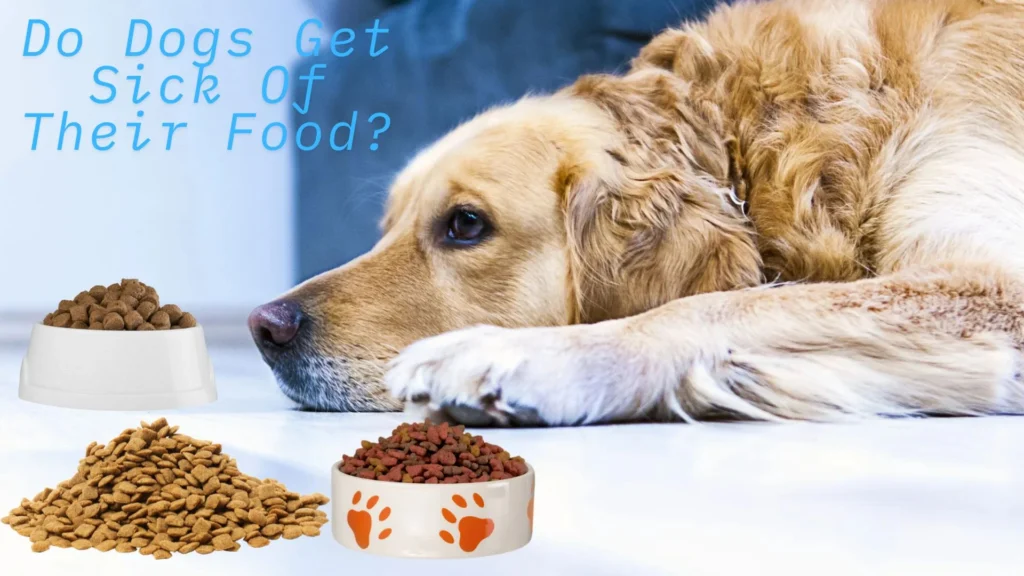As dog owners, we want the best for our furry companions—from long walks in the park to belly rubs at bedtime.
But when it comes to feeding, many pet parents notice something strange: their once-eager eater suddenly snubs their food. This leads to an important question do dogs get sick of their food?
In this ultimate guide, we’ll break down why your dog might seem tired of their food, whether it’s truly a matter of boredom, and what you can do to keep mealtime exciting and healthy.
Dogs Get Sick Of Their Food?
Yes, dogs can get sick of their food, but not in the same way humans do. While they don’t need variety to enjoy meals, they may lose interest if they’re fed the same thing every day, especially if the food is low in flavor or quality.
Changes in appetite can also be caused by health issues, boredom, or too many treats. If your dog suddenly stops eating their usual food, it’s a good idea to check with a vet to rule out any medical problems.
Do Dogs Crave Variety Like Humans?
Dogs don’t crave variety in the same way humans do, but some do enjoy and benefit from it. Unlike people, dogs are creatures of habit and often find comfort in routine including their meals.
However, some dogs may show signs of boredom or decreased interest in their food if it’s the same every day. While they don’t need constant change, rotating high-quality proteins or adding safe, healthy toppers can keep them more engaged at mealtime.
Any changes should be introduced slowly to avoid digestive issues. So while dogs don’t need variety like we do, many can enjoy and benefit from it in moderation.

Do Dogs Actually Get Bored of Their Food?
Yes, some dogs can get bored of their food, though it’s not as common as in humans. Dogs are generally content eating the same balanced diet daily, but certain dogs especially those with strong preferences or high intelligence may lose interest over time.
Signs of boredom can include picking at food, hesitation before eating, or leaving meals untouched. However, it’s important to rule out medical issues first, as appetite changes can signal health problems.
If boredom is the cause, adding safe, nutritious toppers or rotating between vet-approved foods can help re-engage their appetite.
Reasons Your Dog Might Seem “Sick” of Their Food
Although dogs may not literally get “sick” of their food in a psychological sense, there are many legitimate reasons why they might appear to lose interest in eating the same food over time:
1. Palatability Fatigue
Over time, even a highly palatable food may lose its appeal. Dogs may get tired of the same texture, smell, and flavor profile, especially if it’s dry kibble with no variation. Just as you might grow weary of eating the same sandwich every day, a dog might become less enthusiastic about repetitive meals.
2. Health Issues
Loss of appetite can be a symptom of numerous health issues, including dental problems, gastrointestinal upset, kidney disease, or infections. If your dog suddenly stops eating their usual food, a veterinary check-up is essential before assuming they’re just bored.
3. Behavioral or Environmental Factors
Changes in routine, household stress, or even a recent move can impact your dog’s eating habits. Dogs are sensitive creatures, and disruptions to their environment or emotional state can show up in their appetite.
4. Spoiled Food
Even dry kibble can go stale or rancid, especially if not stored properly. Exposure to heat, moisture, or air can degrade food quality and change the smell or taste, making it unappealing to your dog.
5. Overfeeding or Excessive Treats
If your dog gets a lot of treats or table scraps during the day, they might not be hungry enough to eat their regular meals. Worse yet, they may start “holding out” for tastier rewards instead of their basic food.
Signs Your Dog Might Be Bored with Their Food
Here are some behaviors that might indicate your dog is losing interest:
◆ Sniffing but not eating: If your dog inspects the food and walks away, it could be a lack of interest.
◆ Eating reluctantly: If they only eat after encouragement or delay their meals, it might be boredom or another issue.
◆ Begging for human food: A dog that ignores their kibble but begs for table scraps may be craving something more flavorful.
◆ Selective eating: If your dog picks out certain parts of the meal and leaves the rest, this could suggest they’re picky or bored.
Keep in mind that these signs can also indicate a medical problem, so a visit to the vet is essential if disinterest persists.
How To Keep Your Dog Interested In Their Food
If health issues have been ruled out and your dog just seems uninterested in their food, there are several ways to make meals more appealing:
1. Rotate Proteins or Flavors
Switching between different protein sources (e.g., chicken, lamb, salmon) while staying within the same brand or formula can offer variety without upsetting your dog’s digestive system.
2. Add Toppers or Mix-ins
Food toppers, bone broth, or a spoonful of plain pumpkin or yogurt can enhance flavor and nutrition. Always check that add-ins are safe for dogs.
3. Warm the Food
Warming up wet food or lightly moistening kibble with warm water can enhance its aroma and make it more tempting.
4. Interactive Feeders
Puzzle feeders or snuffle mats make mealtime more stimulating and fun. This also slows down fast eaters and engages their brain.
5. Avoid Overfeeding Treats
Too many treats can cause dogs to skip their regular meals. Stick to the 10% rule: treats should make up no more than 10% of your dog’s daily calories.
Should You Regularly Change Your Dog’s Food?
You shouldn’t regularly change your dog’s food without a good reason. Dogs thrive on consistency, and sudden changes can upset their digestive system, leading to vomiting or diarrhea.
However, some dogs benefit from occasional, gradual changes like rotating between different protein sources or adding healthy variety to help prevent food sensitivities and keep them interested.
If you do switch foods, it’s important to do so slowly over 7–10 days by mixing the new food with the old. Always consult your vet before making major changes to ensure it meets your dog’s specific health and nutritional needs.
Tips To Keep Mealtime Exciting Without Risk
If your dog seems bored with their food or you’re simply looking to spice things up a bit (safely), here are some healthy and dog-approved strategies:
1. Try adding a spoonful of plain pumpkin, cooked sweet potato, bone broth (low-sodium), or plain yogurt to their meals. These add aroma, texture, and nutrients.
2. Use puzzle feeders or slow-feed bowls to make meals more engaging. These stimulate your dog’s brain and make eating more rewarding.
3. Warming food slightly can enhance its aroma, making it more appealing. Avoid overheating, especially with wet food.
4. Add a little warm water or low-sodium broth to dry kibble. This softens the texture and releases more smell.
5. Dogs may be more eager to eat after exercise or play, as it mimics their natural hunt-then-eat instincts.
When To See A Vet
You should see a vet if your dog suddenly stops eating, shows signs of vomiting or diarrhea that last more than a day, becomes unusually tired, or behaves differently than usual.
These symptoms could point to a health issue that needs professional attention. It’s always better to be cautious early treatment can prevent more serious problems later. If you’re ever unsure, a quick call to your vet can help guide you.
Final Thoughts
While most dogs don’t require variety and won’t get “sick of their food” in a human sense, they can lose interest in their meals for other reasons both behavioral and medical.
It’s important not to jump to conclusions and assume pickiness. Instead, look for signs, evaluate their feeding routine, and consult your vet when in doubt.
That said, adding safe, nutritious variety to your dog’s meals from time to time can enhance their dining experience and boost their health. Just be cautious, thoughtful, and gradual in how you introduce change.

Hello dog lovers, I am John. Welcome to my website healthydogfoods.com. I am happy to gain experience from my love for my dog and my pet dog. Through my experience and acquaintance with dog veterinarians, I have made myself a proper guide for dogs. I will tell you about dog care, their nutritious food, their proper safety and dog upbringing for a better life. Even though dogs cannot talk like humans, I will solve all the problems by observing their behavior. I will discuss the proper care and related issues of your dog. Which will give you the right answer to all the problems of your beloved dog.